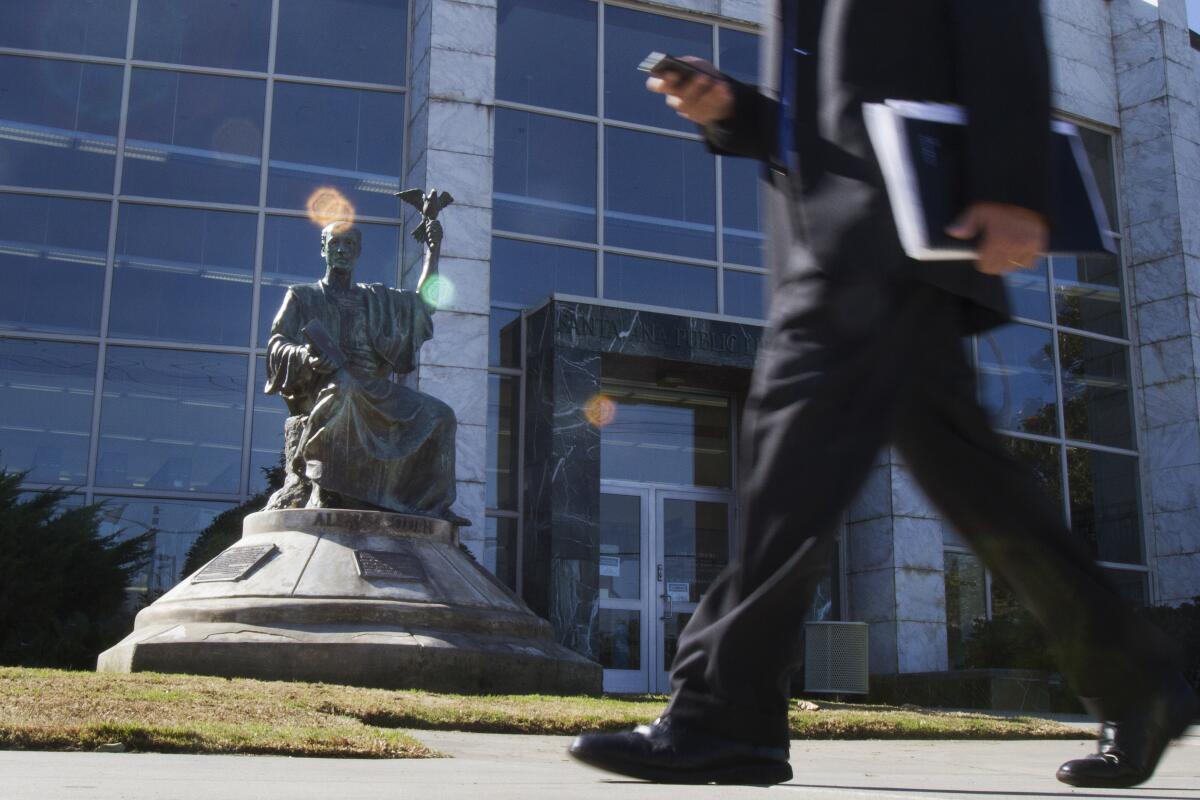Sen. Richard Durbin calls for FBI update on unsolved slaying of O.C. activist Alex Odeh

- Share via
New revelations about a decades-old office bombing in Santa Ana that killed Palestinian American activist Alex Odeh have prompted U.S. Sen. Richard J. Durbin to demand an update from the FBI on the cold case investigation.
Odeh served as West Coast regional director for the American-Arab Anti-Discrimination Committee when, on Oct. 11, 1985, he opened the door to his organization’s Santa Ana office.
A planted pipe bomb detonated and killed the 41-year-old civil rights leader; to this day, the FBI has never publicly named any suspects in the still-unsolved assassination.
Durbin, a Democratic Senate Majority Whip from Illinois and Chair of the Senate Judiciary Committee, sent a letter dated Dec. 17 to FBI director Christopher A. Wray.
It cited recent TimesOC reporting on the Odeh case, which was published in the Los Angeles Times.
“For more than 35 years, the perpetrators of this gruesome crime have successfully evaded justice,” Durbin wrote. “Last month, three suspects were once again publicly identified, in this instance by Hugh Mooney, a Santa Ana police officer involved in the Odeh case. Given these recent revelations, the FBI must intensify its efforts to investigate the murder of Mr. Odeh and bring his killers to justice.”
Mooney previously told TimesOC that four Joint Terrorism Task Force members, including FBI agents, arrived to the scene of the bombing by helicopter. According to the retired police lieutenant who managed the crime scene that day, task force members shared with him the names of two extremists under surveillance up until that morning: Bob Manning and Keith Fuchs.
Delivered Monday, Durbin’s letter to the FBI represents the highest level of political interest in the Odeh case.
“I’m happy that my father’s murder is getting the attention of a U.S. Senator now,” said Helena Odeh, Alex’s eldest daughter and a board member of the ADC’s Orange County chapter. “It feels like the case is always at a standstill. All we’ve been asking for is justice.”
In 2013, former House members Loretta Sanchez and John Conyers wrote Rep. Bob Goodlatte, the U.S. House Judiciary Committee Chair at the time, and requested a hearing on the Odeh case. Conyers chaired such a congressional hearing in 1986, but none followed in its wake.
Two years after the joint letter, Sanchez called for U.S. Atty. Gen. Loretta Lynch to give an update on the case upon the 30th anniversary of the bombing.
Past efforts by congressional lawmakers have brought momentum and renewed attention to the unsolved murder, but little else. The ADC hopes that Durbin’s letter proves more consequential.
“This is very important and significant development, politically,” said Abed Ayoub, ADC’s National Legal and Policy Director. “To have a senior member of the Senate, Majority Whip and Chair of the Senate Judiciary Committee take a serious look at this case is welcoming, and long overdue. We hope that it brings some answers from the FBI about what’s taking so long in this case and why justice hasn’t been brought for those responsible for Odeh’s murder.”
Rep. Lou Correa, whose 46th congressional district includes the site of the bombing, had previously introduced a House resolution memorializing Odeh and welcomes the letter by fellow Democrat Sen. Durbin.
“I’m very pleased that Sen. Durbin, as Chairman of the Senate Judiciary Committee, is asking the FBI for a report on this terrorist attack on an American on domestic soil,” said Correa. “This is a constituent — a leader of civil rights — that was killed in my district. These kinds of acts cannot be tolerated.”
A month after the Odeh bombing, FBI spokesman Lane Bonner publicly attributed the attack to the Jewish Defense League, an extremist group founded by the late Rabbi Meir Kahane. The agency later backpedaled on naming the JDL and has not done so since.
In 1988, sources close to the investigation in California and New York informed The Times that Manning, a JDL member, was considered to be one of at least four suspects — all of whom reportedly lived in Israel at the time— in the crime.
Manning was later extradited from Israel in 1993 to stand trial in the mail bomb murder of a Manhattan Beach secretary. He’s currently serving a life sentence for the crime in federal prison.
Though he was never charged in connection with the 1985 bombing, the Odeh family and ADC are considered to be Manning’s “victims” under an internal Justice Department classification and have been allowed to speak before his parole hearings in 2018 and 2020.
After Manning’s extradition and conviction, Mooney attended a 1996 multiagency meeting about the Odeh case at the FBI’s Los Angeles field office.
According to Mooney, efforts to similarly locate Fuchs and Andy Green, another member of the JDL, were allegedly foiled by both a lack of Israeli cooperation and State Department disinterest.
Given Mooney’s public statements, Durbin called on the U.S. government to do everything within its power to bring justice in the Odeh case and quoted President Joe Biden’s remarks in August about terrorists who target Americans at the end of the Afghanistan war in principle.
“This heinous case of domestic terrorism must be professionally investigated and, finally, resolved,” Durbin wrote. “In order to preserve the rule of law and deter future would-be attackers, the terrorists who murdered Alex Odeh must not escape accountability.”
All the latest on Orange County from Orange County.
Get our free TimesOC newsletter.
You may occasionally receive promotional content from the Daily Pilot.






